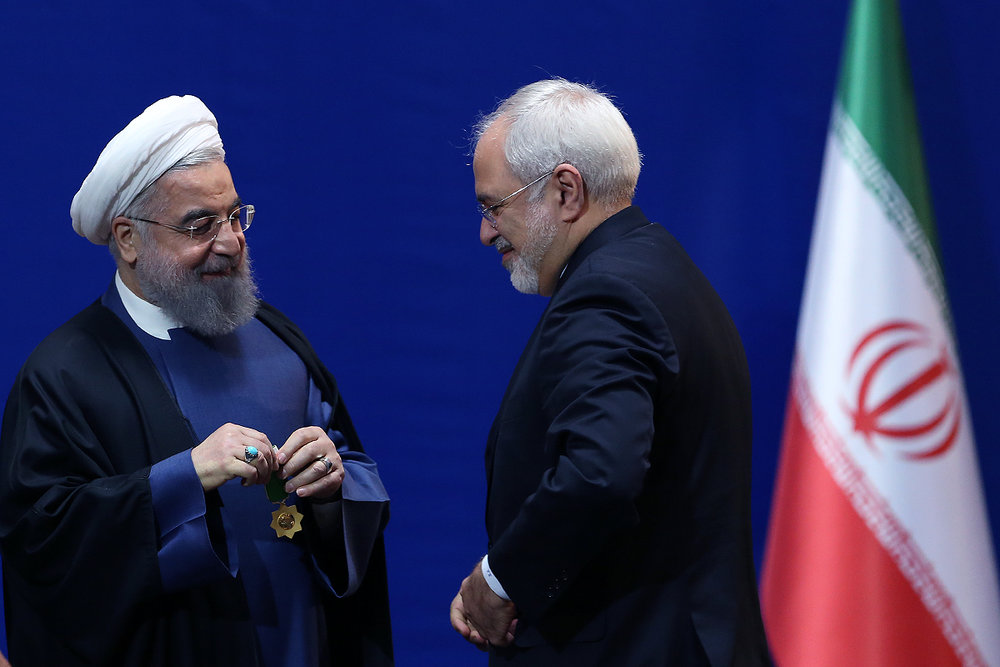Here’s why President Rouhani will extend Zarif’s tenure

TEHRAN – As re-elected President Hassan Rouhani is nearing inauguration on August 5, there is increasing guessing work about his cabinet makeup.
Individuals close to the moderate president has anticipated a major reshuffling. Early June, Mohammad Ali Najafi, an aide to Rouhani, said: “My forecast is that 50 percent of the incumbent cabinet will change.”
Critiques have particularly taken a swipe at the administration’s economic record, arguing that unemployment among others lingers.
So, most probably ministers with an economic mission should give way to younger, more energetic options.
Unlike the lesser reappointment chance for economic ministers, certain other ones, including foreign, oil, and health ministers, are indisputably assured of a second term, unless they decline to continue themselves.
“By what we have heard, ministers of foreign affairs, health, and intelligence will be kept in their posts,” Fatemeh Zolghadr, an MP who representing Tehran in Parliament, said recently.
From among the above, one can double down on Zarif. There are at least four reasons why he will remain as foreign minister for a second four-year term.
Very importantly, Zarif has the trust of Rouhani and Ayatollah Khamenei, Leader of the Islamic Revolution.
Frequently, Ayatollah Khamenei has spoken highly of the 58-year diplomat, calling him a “conscientious and pious”, for whom he “keeps praying”.
“In the nuclear negotiations, Mr. Zarif and his colleagues passed a good test,” the Leader was quoted as having said at the wake of the fruitful talks between Iran and six world powers on Tehran’s nuclear activities in 2015.
Meanwhile, Rouhani has thrown his full support behind Zarif and the policies he has been pursuing in the region and larger world.
“Had anybody other than Dr. Zarif been heading the negotiation team, we wouldn’t have stood where we are today,” Rouhani had said of him.
A second reason for reappointment of Zarif is the very nuclear deal, formally known as the Joint Comprehensive Plan of Action (JCPOA).
For the nuclear accord to endure over a maximum of 15 years, as agreed upon by the signatories, a clear-minded, there is need for an intelligent politician who manages to insulate the deal from those ill-disposed to the deal.
He is well familiar with the structure of international bodies, has a perfect command of the English language, and has been in a multi-pronged effort to militate against Washington’s hostile measures which can derail the nuclear deal.
Receiving the Chatham House prize in November 2016, former U.S. Secretary of State John Kerry said: “I want to make it clear that Javad is a very tough, very capable negotiator, a patriot all the time, who fought hard for his nation’s interests, while always trying to find a constructive way to solve the problems that we both understood were huge obstacles for both of our countries, for both of our people, for our politics, and the divisions that exist at home for each of us.”
It has been due to this multi-pronged and fluid strategy that he succeeded to fight back U.S. President Trump’s harsh rhetoric about the deal with a European antidote.
The bespectacled, smiley Zarif has also other unaccomplished missions, which require his full engagement in his capacity as foreign minister. A priority issue is the Syrian crisis and the Astana initiative mediated by Russia, Iran, and Turkey. Tehran has been seriously involved in the negotiations and is one of the “peace guarantors” in the beleaguered country, and is in the middle of finalizing the “de-escalation zones” plan with Turkey and Russia.
Aside from the Syrian agenda, strained relations between Iran and certain Arab countries, including archrival Saudi Arabia, need to be seriously addressed, otherwise costs for both sides are unavoidable.
To this, one has to add the handling of the Qatar siege in such way to avoid further complicating Arab ties.
Last but not least, Zarif was and continues to be a heavyweight for Rouhani. During the presidential campaign, Zarif wholeheartedly did canvassing for Rouhani in video ads, helping to tip balance in favor of him.
Without the nonchalant foreign policy mastermind, Rouhani will be less likely to deliver his pledge for a regional détente and will face difficulty to pursue a hands-off approach to external events.
PA/PA
